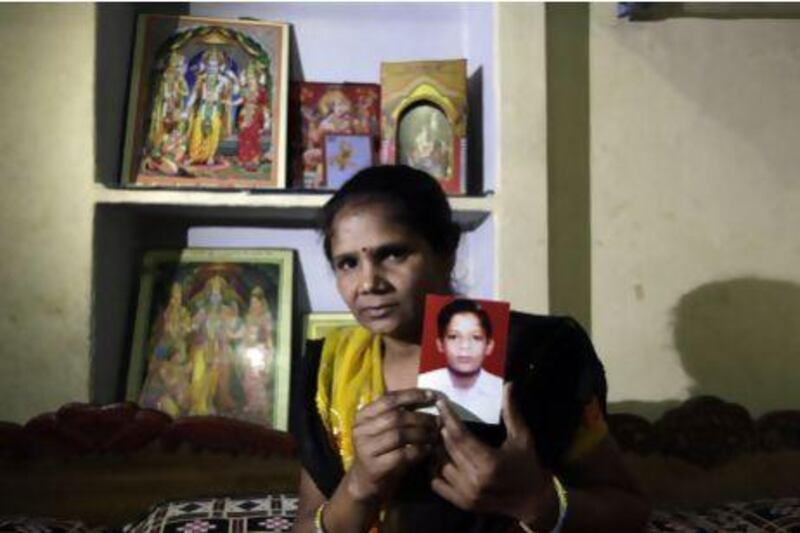NEW DELHI // A child disappears. Police are called. Nothing happens.
Child-rights activists say the rape last week of a five-year-old girl is just the latest case in which Indian police failed to take urgent action on a report of a missing child. Three days after the attack, the girl was found alone in locked room in the same New Delhi building where her family lives.
More than 90,000 children go missing in India each year; more than 34,000 are never found. Some parents say they lost crucial time because police wrongly dismissed their missing children as runaways, refused to file reports or treated the cases as nuisances.
The parents of the five-year-old said that after their daughter disappeared, they repeatedly begged police to register a complaint and begin a search but they were rejected. They also said police offered them a bribe after the girl was found to keep quiet.
Other poor parents of missing children said they also have found police reluctant to help them.
In 2010, police took 15 days to register a missing-persons case for 14-year-old Pankaj Singh. His mother is still waiting for him to come home.
"Every day my husband and my father would wait at the police station but they would shoo them away," Pravesh Singh said as she sat on her son's bed, surrounded by his pictures and books.
One morning in March 2010, she fed her son a breakfast of fried pancakes and spicy potatoes, then left for a community health training programme.
"He told me he would have a bath and settle down to study for his exams," said Ms Singh, clutching the boy's photograph to her heart.
When she returned, he was gone. "The neighbours said some boys had called him out. We searched everywhere, went to the police, but they refused to believe that something had happened to our son."
The police insisted he had run off with friends and would return, she said.
"They said we must have scolded him or beaten him, which is why he had run away from home."
Formal police complaints were registered in only one-sixth of missing-child cases in 2011, said Bhuwan Ribhu, a lawyer with Bachpan Bachao Andolan, or the Save the Childhood Movement. He said police resist registering cases because they want to keep crime figures low, and that parents are often too poor to bribe them to reconsider.
"It's easy enough to blame the police for not finding the children. Some of the parents do not even possess a photograph of the child. Or they will come up with a years-old picture. It becomes difficult when there's not even a photograph to work with," the Delhi police spokesman, Rajan Bhagat, said last month when asked about complaints on police inaction in investigating case of missing children.
Many cases involved poor migrant construction workers who move from site to site around the city, Mr Bhagat said.
"The children are unfamiliar with the place and once they lose their way, they wouldn't know how to return," he said.
Krishna Tirath, India's women and child development minister, told parliament last month that the problem of missing children had assumed "alarming" proportions. The National Crime Records Bureau reported that 34,406 missing children were never found in 2011, up from 18,166 in 2009.
Activists said some children were trafficked and forced to beg on the streets. Some work on farms or factories as forced labour and others have their organs harvested and sold. The activists said young girls are pushed into the sex trade or sold for marriage.
In 2006, the Central Bureau of Investigation said at least 815 criminal gangs were kidnapping children for begging, prostitution or ransom. The Save the Childhood Movement said police have not cracked a single one of those syndicates.
"Despite our providing the police with all the details of where a child was picked up from, where he was taken, the police are simply not willing to act," said Mr Ribhu.
Shantha Sinha, who heads the government's National Commission for Protection of Child Rights, acknowledged that much remained to be done to make police take seriously cases of missing children.
"There has to be a strong message that in every incident of a missing child, a criminal case has to be registered and the case is properly investigated," Ms Sinha said.
Kunwar Pal, a construction worker, fears police indifference crushed his efforts to find his son Ravi Kumar.
Since the 12-year-old disappeared three years ago, he has cycled across the sprawling capital, visiting police and railway stations, children's homes and hospitals, handing out posters and photographs of his missing son. Every time he hears of a child found anywhere in the city, he cycles to the police station, hoping it's Ravi.
Mr Pal, 45, refuses to think the worst. He believes Ravi was taken by a childless couple who wanted a child of their own.
"If they were to let me know somehow that my son is alive, I would be happy," said Pal. "They can keep him. Just let me see his shadow. Just let me know he's safe."





